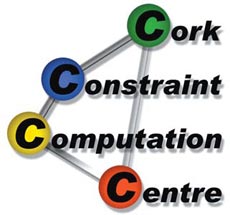| 2005 |

|
YEAR BOOK |
University College Cork
|
Cork Constraint Computation Centre
– making hard choices easier
|

Research Agenda
Difficult problems can offer too many choices, many of which are incompatible, few of which are optimal. The Cork Constraint Computation Centre (4C) develops the basic science that will make it easier for computers to help us make these choices.
Some examples of constraints:
-
The separation between the soldermasks and nets should be at least 0.15mm.
-
This model only comes in blue and green.
-
This cable will not handle that much traffic.
-
These sequences should align optimally.
-
John prefers not to work on weekends.
-
The demand will probably be for more than 5 thousand units in August.
Some examples of constraint satisfaction or optimisation problems:
-
Schedule these employees to cover all the shifts.
-
Optimise the productivity of this manufacturing process.
-
Configure this product to meet my needs.
-
Find any violations of these design criteria.
-
Optimise the use of this satellite camera.
-
Align these amino acid sequences.
We apply advances in artificial intelligence and other disciplines to make constraint programming more powerful, more practical and easier to use.
History
The Cork Constraint Computation Centre was established in October of 2001 when Professor Gene Freuder received a Science Foundation Ireland Principal Investigator (Fellow) Award and moved his research lab from the U.S. to merge with the Constraint Processing Group in the UCC Department of Computer Science. 4C has attracted additional funding from the Science Foundation, Enterprise Ireland, the Irish Research Council for Science, Engineering and Technology Embark Initiative, the European Union, and from industry.
Technology Transfer
4C has an Industry Associates Program with over 50 members. We engage with industry and government in a variety of modes. Recent projects include: process design for efficient scheduling with Bausch & Lomb and support from the Enterprise Ireland Innovation Partnerships Initiative; automated construction of optimisation models for the manufacturing enterprise with the University of Limerick and several local companies and support from the Embark Initiative; conversational recommender systems for configurable products, with a steering board from the local business and venture capital community and support from the Enterprise Ireland Commercialisation Fund; document layout with Xerox and support from the Xerox University Affairs Committee; materials management optimisation with the Southern Health Board. 4C leads the Value Chain Optimisation strand of the multi-institutional Centre for Telecommunications Value-chain-driven Research, part of a €69M initiative involving Science Foundation Ireland, the IDA, and Lucent Technologies, which has brought Bell Labs to Ireland.
International Outreach
4C is bringing international meetings to Ireland. These include the 2003 International Conference on Principles and Practice of Constraint Programming, the 2004 International Joint Conference on Automated Reasoning, and in 2006, the International Conference on Integration of AI and OR Techniques in Constraint Programming for Combinatorial Optimisation Problems. We are also averaging about 20 individual scientific visitors a year from all over the world. We collaborate with researchers from over half a dozen countries. For example, we have a collaboration with CUNY in the U.S., funded by NSF in the U.S. and Enterprise Ireland in Ireland, and a collaboration with LIRMM-CNRS in France, funded by the CNRS in France and IRCSET in Ireland. We present papers around the world, and are very well represented at the top international conferences in constraint programming and artificial intelligence. For example, we will be presenting seven papers in Edinburgh at the 2005 International Joint Conference on Artificial Intelligence, which accepted only 18% of submissions.
Human Capital
There are currently close to 50 academics, staff and students associated with 4C, who come from over a dozen countries. 4C has involved undergraduates in research and is engaged in outreach efforts to younger students in Ireland.
Contact: Professor Gene Freuder, Director,
4C, UCC, Cork;
E-mail: [email protected] ; Web: www.4c.ucc.ie